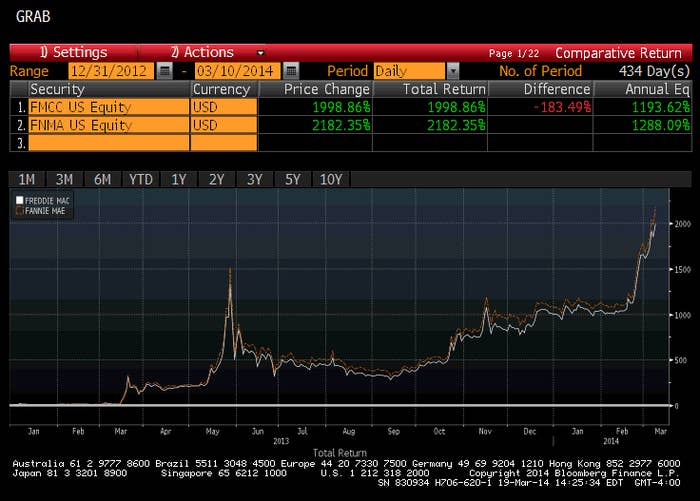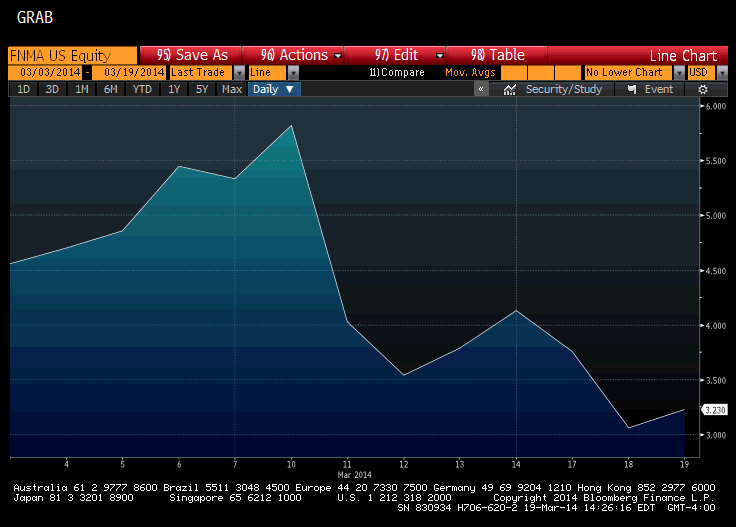Fannie Mae and Freddie Mac shareholders, who haven't received a dividend on their preferred or common stock since the companies were saved from collapse via a government takeover in 2008, have attracted the sympathy of a strange group of allies, ranging from New York Times columnist Gretchen Morgenson and former Presidential candidate Ralph Nader to a conservative senator and hedge fund managers.
The collective outrage of this ideological motley crew stems from several factors, not the least of which was a new bill released Sunday by the two ranking members of the Senate Banking Committee, Tim Johnson and Mike Crapo, calling for Fannie and Freddie to be wound down and replaced with a government-guaranteed entity that would insure bonds made from mortgages but only after private investors took a loss first. Right now, Fannie and Freddie help prop up the U.S. mortgage industry, and especially the standard 30-year fixed rate mortgage by guaranteeing bonds made up of mortgages.
The proposed bill added that any actions to wind down Fannie and Freddie would be done to "maximize the return" of "senior preferred shareholders," — meaning the government. A provision of the bill also enshrines the 2012 decision by the Treasury Department to sweep nearly all of Fannie and Freddie's profits and not allow them to rebuild their capital base.
By next month, Fannie and Freddie will have paid the government $203 billion, more than the $189 billion infusion in warrants they received in the form of "senior preferred stock" from the government in 2008 for 79.9% of the companies in order to avoid liquidation. The common stock of both companies has gained almost 2000% from the end of 2012 through the beginning of last week as they returned to profitability and made huge payments to the government from their earnings.
Yet none of that has gone to the holders of the stock, like hundreds of community banks. According to a paper by Federal Reserve economists some 600 banks have suffered $8 billion in loses on investments in Fannie and Freddie shares they owned, sometimes at the behest of their regulators, and that "fifteen failures and two distressed mergers either directly or indirectly resulted from the takeover" by the government.
Fannie's and Freddie's common stock has gone up 2000% since the beginning of last year.

Several lawsuits from investors with large stakes in the preferred stock of the two companies are working their way through the courts to declare the sweep illegal.
The government's actions prompted Nader to call shareholders' treatment "uniquely reprehensible." And crusading New York Times investigative reporter Gretchen Morgenson gave the shareholders perhaps their biggest public boost by writing a column critical of the government's actions last month.
Morgenson was one the harshest critics of Fannie's and Freddie's actions before the crisis. Other critics of the "sweep" include libertarians like New York University law professor Richard Epstein and conservatives like University of Pennsylvania law professor David Skeel, who said that the government was "astonishingly duplicitous" in sweeping away the compnay's profits.
And Fannie's stock has been violently volatile since news of the Johnson/Crapo bill.

In a note, Isaac Boltanksy, an analyst at Compass Point, said that there was little chance of Fannie and Freddie reform happening before the midterm elections in November: "2015 or 2017 as far likelier dates for legislation to head to the President's desk."
"Until the end of this year nothing is going to happen, I don't think there's much of a chance of a senate working coming close to being in any sort of agreement with the house," said Ike Brannon, a former staffer on the Joint Economic Committee and the president of the consulting firm Capital Policy Analytics.
But while the bill may not pass, it is a marker for many of the powerful figures who will determine the fate of Fannie Mae and Freddie Mac — like Senator Mike Crapo, who would be next in line to chair the Senate Banking Committee if the Republicans take back the Senate in the next Congress — that they have little interest in seeing the companies's shareholders recoup their losses.
Gordon Bose, an analyst at Keefe, Buyette, & Woods, said in a note Tuesday that Fannie and Freddie preferred stock could be made whole by 2018, providing the investors win in court and there's no reform of the two comapnies.
"I think it would be difficult to see them doing anything until this is adjudicated by the courts," Brannon said.
One lawmaker who has spoken up on behalf of Fannie and Freddie shareholders is Pennsylvania Senator Pat Toomey, who said in a letter to Treasury Secretary Jack Lew last week that investors "should not be denied their fair share of any remaining value" of the two enterprises.
Brannon said that, "I think there are people on the House side who are outraged on this," but still nothing like a critical mass in either chamber or either side of the aisle — he couldn't even identify a single lawmaker besides Toomey.
This makes the enterprsises' stock functionally a bet on court action and Congressional inaction. And that bet has taken a hit. After rising by about 2000% from the end of 2012, in Fannie's case from 25 cents to $5.81 on March 10, the stock have gotten whipsawed by any news on the Johnson-Crapo bill. On March 11, Fannie's common stock fell from $6.29 to $3.57 and now sits at $3.22.
